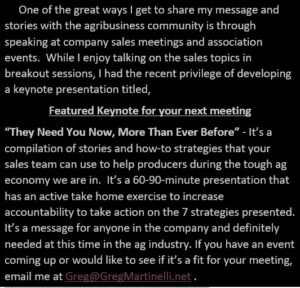These killers lurk in the darkness of our minds. They put a stranglehold on creativity, growth and success. They hold us back and slow us down from reaching our potential. The first step to overcoming is to identify them and recognize which ones are killing our sales results. If you find yourself thinking that none of them apply to you, I’d suggest getting a coach to work with. You might be in severe denial. Because over the course of a sales career, these five killers creep into your life at some point.
- Fear
Fear, worry, and anxiety are killing your sale. How? When fear creeps in, we tend to pull back and withdraw. We hesitate or come to a complete stop. When selling, this looks like:
- Not asking questions because we fear we should already know the answers or we might come across as too nosy. So, we don’t dig in and ask the higher value questions.
By not asking questions, we fail to uncover the customer’s true needs, values, desires.
By not knowing the customer’s true needs, values and desires, we present on products that we “think” they might need or want.
Sometimes, we get lucky and get it right. Often, however, we miss the target by presenting on products the customer is not interested in buying. That’s when we hear the familiar, “Let me think about it”
- Other ways fear kills your sale: Fear of Closing: We get so fearful that the customer is going to say “No”, that we just continue to bombard them with presentation material. We throw more charts, more data, more, more, more…. We sound like the Ginsu knife commercial, “But wait, there’s more”. Coaching salespeople, I saw this happen a lot. In my head I’m screaming, “You’ve presented enough. Somebody Close this sale already!”
- Failure
Like many things, sales is a game of failures. You fail often before you get better, before you figure out what works and what doesn’t. However, the fear of failure or fear of “not doing it right” holds us back and shuts us down from persisting See what Ray Kroc had to say about failing and persistence on his journey to build McDonald’s 7 Lessons from the Founder
Things to watch out for:
- “We tried that once and it didn’t work”
- Failing and not adjusting your approach: The old saying about the insanity of doing the same thing and expecting different results fits here. You need to learn from your mistakes. Make adjustments and try again.
- Adjusting your approach with no process: Don’t just take wild guesses or shots in the dark as to what might work. Learning from your mistakes is a start, but you need to have a thought process and measure it.
- High hopes – I love positive and high-spirited people just like the next guy. But be wary of getting too set on a positive outcome. When it doesn’t happen, it can be devastating. So, keep some perspective.
- Mundane
Sales is often depicted as flashy folks making big deals at a buyer’s office by selling them products they didn’t want. The salesperson is depicted as being a born salesman. A rebellious sort that doesn’t need anything but his wits to sell the account.
Wrong and simply a myth. Does that person exist and do they make sales that way? Sure. But the top salespeople in any field will tell you the truth about being a great salesperson – “It’s work!” Sales and serving your customer simply boils down to work – mundane, often boring, tedious work.
What’s mundane but makes you great in sales?
- Doing a pre-call plan. Nobody likes to do homework, but it pays off big when you get to the sales call.
- Taking good notes. Sure, I’d rather just stay in the moment of the conversation and not take notes on a sales call. If you think you will remember everything, try this test. On your next sales call, take good notes. Wait two days and go back and read those notes. Were you amazed at how much information from that conversation you forgot?
- Following up after a sales call and doing what you promised. Sending the email, you said you would. Checking on a credit to their account. Getting them the price on a product they are interested in. All are trust building activities that tell your customer you are reliable.
- Tracking down account details before calling on a customer.
- Ensuring customer accounts are set up properly, orders are in correctly, etc.
- The most mundane but most important task in sales: Calling on prospects for the 5th, 6th, 20th, 40th Figuring out how to stay relevant to a prospect after you’ve called on them dozens of times is simply tough work.
Do we have to do all of the mundane tasks listed above? Certainly not. Can we “wing it” and make a sale? Certainly. That’s the excuse we use. We hit the “Easy” button in sales. We “Wing it” because that worked once for us. Plus, “I’m too busy to do all this stuff!” or “Don’t we have someone to do this for us?”
- Belief
Without belief, you unknowingly kill your sale. You have to be a believer in key areas to be successful in sales.
- Belief in yourself: This is first and foremost. I’m not talking about false, pump me up rhetoric about, “I can do anything”. That only lasts until the first customer shuts you down with an objection. Your ego is riddled and there goes your belief in yourself. The belief I’m talking about is getting strong on the technical side of your business so you can be confident in your ability to solve problems. Getting strong on the soft skills of selling so you can be confident in your selling skills. Become a continuous learner and earn your belief in yourself. That way, you are not shaken in your beliefs when a customer challenges you with a price objection.
- Belief in your products/service: This is an absolute must. You have to believe in them enough that you use them yourself. This may not be completely practical. For example, if you sell passenger airplanes, most likely, you can’t own one yourself. If so, then you have to believe in them enough that you would use them if you were in your customer’s shoes.
- Belief in your customer: Occasionally I run across someone selling to customers they dislike or have a very negative opinion of their business skills. They will say things like, “All of them are price buyers.” “None of them can figure out how to ….” And often, they make much worse comments about their customers. Maybe the sales person just had a bad day or he’s burnt out on calling on customers. Either way, these salespeople are typically justifying their failure by blaming the customer.
- Belief in your solution: You have to believe that you are bringing the best solution to this customer’s problem. When you do, you won’t want your customer to go another day without your solution. It will make the focus of your sales call very clear. Closing on the sale will not feel “salesy” at all. You truly want to help this customer.
- Comfort
Comfort sounds like, “Let’s just do what we did last year” or “I don’t need to do all that. I’ve been selling for 25 years” or “My customers don’t want all those fancy sales tactics. I just need to go out there and be me”
The motivation behind all of these comments is laziness. We all have it. I feel like doing the same thing I did for the last customer. Just pull out the PowerPoint, switch the company name on the first page and “Bam” I can wing it from there. Do you think the customer picks up on it? Do you think you start to sound like a drone? Clicking through the presentation like one of those tour guides that gives the same presentation ten times a day? The answer to all is “Yes”. And the worst part is the customer will never tell you. Because it’s too confrontational to tell a salesperson, “Hey, sounds like you are bored to tears giving me this sales pitch”. So, they let you finish your presentation, thank you for stopping by and say, “Let me think on it”
Now that we’ve shined a bright spotlight on these five killers lurking in the dark recesses of your mind (Whoa, that’s too serious). Now that we’ve Identified the five sales killers, come back next week as we dig into coping with and defeating them.





